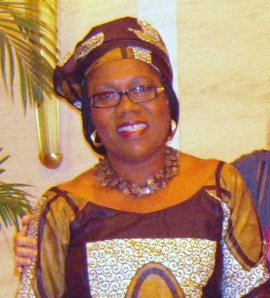
Some poems stay with you forever. They are there when you need them- they nag you, inspire you, make you change your world, comfort you when you need comforting, help you climb your own hills as if you were a hill climber. Some poems manufacture other poems within your deepest guts, and make you walk on water. Some poets remain with you like the poems they carve, and as a poet, when that happens, you become what you were to be. You come across these poems in school, often as early as grade school, in college, during your search for your own poetry career, and are there when you need that extra push. They shape your philosophy about poetry, about the world and its people, and you go back to them again and again for solace. For me, the poets I am listing and many more that cannot fit this blog’s limited pages, these poets and poems have been with me forever. They have influenced me in some ways, often, helping me carve up my own career as a poet. Even though I have picked out just one poem from some of these poets, there are many more of their poems that have affected me positively. What I want my own poetry to do for my readers, lovers of my poetry and those who are eternally lovers of any poetry is that I affect you just as beautifully as these poets have affected me. I want to help you carve up the brushes along your own path, and find where you’re going. I am not saying that poetry is everything, that poetry is god; I am saying that poetry is essential to our lives, and that each of us is a poet inside, whether we know it or not, In any case, if I inspire you in any way, just find a moment and write a poem, read a poem, or just support a poet. Poets are not rich people. They work very hard and hardly ever get paid for helping to reshape the world. Enjoy my poets the way I enjoy them, and leave a note if you feel strongly about poetry.

John Pepper Clark Bekederemo
(1935- Present)
Nigerian Poet and Playwright, John Pepper Clark Bekederemo was one of my first favorites. His use of African oral traditional images, the dirge, song, and music in his style intrigued me. His ability to capture the Nigerian civil war in “The Casualties” affected me decades before I could even imagine that I too, would be a victim of a civil war in my own country.
THE CASUALTIES
————-John Pepper Clark Bekederemo
The casualties are not only those who are dead;
They are well out of it.
The casualties are not only those who are wounded,
Thought they await burial by installment
The casualties are not only those who have lost
Person or property, hard as it is
To grape for a touch that some
May not know is not there
The casualties are not those led away by night;
The cell is a cruel place, sometimes a heaven,
No where as absolute as the grave
The casualties are not those who started
A fire and now cannot put to out. Thousands
Are burning that had no say in the matter.
The casualties are not only those who escaping
The shattered shell become prisoners in
A fortress of falling walls.
The casualties are many, and a good number well
Outside the scene of ravage and wreck;
They are the emissaries of rift,
So smug in smoke-room they haunt abroad,
They are wandering minstrels who, beating on
The drum of human heart, draw the world
Into a dance with rites it does not know
The drum overwhelm the guns…
Caught in the clash of counter claims and charges
When not in the niche others have left,
We fall.
All casualties of war,
Because we cannot hear other speak,
Because eyes have ceased to see the face from the crowd,
Because whether we know or
Do not know the extent of wrong on all sides,
We are characters now other than before
The war began, the stay- at- home unsettled
By taxes and rumor, the looter for office
And wares, fearful everyday the owners may return,
We are all casualties,
All sagging as are
The case celebrated for kwashiorkor,
The unforeseen camp-follower of not just our war.

Wole Soyinka
(July 13, 1934- Present)
Wole Soyinka, Nobel Prize winning poet in Literature, playwright and memoirist is one of my favorite. I admire his use of African oral tradition in his plays, but “Telephone Conversation’s” biting sarcasm and wit can knock anyone off their feet. I discovered the poem while I was still in high school, and have loved it since. I met the great one during the African Lit. Association conference in Burlington, VT last April, and of course, he was a great orator, literary critic and all during his keynote address to our conference.
Telephone Conversation
——————by Wole Soyinka
The price seemed reasonable, location
Indifferent. The landlady swore she lived
Off premises. Nothing remained
But self-confession. ‘Madam,’ I warned,
‘I hate a wasted journey – I am African.’
Silence. Silenced transmission of
Pressurized good-breeding. Voice, when it came,
Lipstick coated, long gold-rolled
Cigarette-holder pipped. Caught I was, foully.
‘HOW DARK?’ . . . I had not misheard. . . .
‘ARE YOU LIGHT OR VERY DARK?’
Button B. Button A. Stench
Of rancid breath of public hide-and-speak.
Red booth. Red pillar-box. Red double-tiered
Omnibus squelching tar. It was real! Shamed
By ill-mannered silence, surrender
Pushed dumbfounded to beg simplification.
Considerate she was, varying the emphasis –
‘ARE YOU DARK? OR VERY LIGHT?’ Revelation came.
‘You mean – like plain or milk chocolate?’
Her assent was clinical, crushing in its light
Impersonality. Rapidly, wave-length adjusted,
I chose. ‘West African sepia’ – and as afterthought,
‘Down in my passport.’ Silence for spectroscopic
Flight of fancy, till truthfulness clanged her accent
Hard on the mouthpiece. ‘WHAT’S THAT?’ conceding
‘DON’T KNOW WHAT THAT IS.’ ‘Like brunette.’
‘THAT’S DARK, ISN’T IT?’ ‘Not altogether.
Facially, I am brunette, but madam, you should see
The rest of me. Palm of my hand, soles of my feet
Are a peroxide blonde. Friction, caused –
Foolishly madam – by sitting down, has turned
My bottom raven black – One moment madam!’ – sensing
Her receiver rearing on the thunderclap
About my ears – ‘Madam,’ I pleaded, ‘wouldn’t you rather
See for yourself?’

Gwendolyn Brooks
Gwendolyn Brooks (1917 – 2000), one of my favorite poets that I met before she died. I was a part-time instructor of English, African and African American Lit. at Aquinas College in Grand Rapids Michigan. She was a visiting poet at that Catholic college sometime in the middle 1990s. After her reading, I stood in line to meet her, and she noticed me in my African dress, and drew me close. I was of course, a part-time teacher, an insignificant person as far as my colleagues were concerned, and I was having the toughest time in my career that year. In fact, I had the worst experience of my teaching life at that college, so it was such a fresh blessing to be spoken to in such kind words by the famous Gwendolyn Brooks, whose work I was teaching in my African American Lit. classes there. I told her that I was a poet or at least I thought I was, unpublished in the US, and looking forward to putting together my first book of poems. She hugged me, smiling proudly, telling me that if I had made it out of the Liberian civil war then in 1995, I would make it to be the finest poet ever. Maybe she was right; maybe not, however. When I finally got a publisher in 1997, I sent my manuscript to the famous poet, asking her for a blurb. She wrote back immediately, telling me that she was not doing well, and was dealing with the pressure of finishing one last book before life could overtake her; cheering me on, she told me how proud she was of me, and that she wished me a great career as a poet. She also sent me a card, congratulating me on my publication. Her long letter, written in her fine handwriting even then, gave me more reason for my dream to be a poet. I knew then that it was not only my father, Moses C. Jabbeh, who could push me on. She also recalled meeting me years earlier, and that her hopes for me had been realized. Very rarely does one ever come across a sweetheart such as Gwendolyn Brooks.
Young Afrikans
by Gwendolyn Brooks
of the furious
Who take Today and jerk it out of joint
have made new underpinnings and a Head.
Blacktime is time for chimeful
poemhood
but they decree a
jagged chiming now.
If there are flowers flowers
must come out to the road. Rowdy!—
knowing where wheels and people are,
knowing where whips and screams are,
knowing where deaths are, where the kind kills are.
As for that other kind of kindness,
if there is milk it must be mindful.
The milkofhumankindness must be mindful
as wily wines.
Must be fine fury.
Must be mega, must be main.
Taking Today (to jerk it out of joint)
the hardheroic maim the
leechlike-as-usual who use,
adhere to, carp, and harm.
And they await,
across the Changes and the spiraling dead,
our Black revival, our Black vinegar

(26 March 1859 – 30 April 1936)
A.E. Housman was one of my favorites when I was a grade school student. I loved his narrative style and his ability to create concrete images that made the storyline in his own violent world then, real. Most of all, I loved his ability to deal with real issues of life, dying, conflict of relationships and the world of youth.
Is My Team Plowing by A. E. Housman
“Is my team ploughing,
That I was used to drive
And hear the harness jingle
When I was man alive?”
Ay, the horses trample,
The harness jingles now;
No change though you lie under
The land you used to plough.
“Is football playing
Along the river shore,
With lads to chase the leather,
Now I stand up no more?”
Ay, the ball is flying,
The lads play heart and soul;
The goal stands up, the keeper
Stands up to keep the goal.
“Is my girl happy,
That I thought hard to leave,
And has she tired of weeping
As she lies down at eve?”
Ay, she lies down lightly,
She lies not down to weep,
Your girl is well contented.
Be still, my lad, and sleep.
“Is my friend hearty,
Now I am thin and pine,
And has he found to sleep in
A better bed than mine?”
Yes, lad, I lie easy,
I lie as lads would choose;
I cheer a dead man’s sweetheart,
Never ask me whose.

Nikki Giovanni
(June 7, 1943-Present)
I have never met Nikki Giovanni, but she was one of my earliest influences as a young poet, writing in Monrovia, Liberia. I heard her read one of her most powerful poems about the connection between African Americans and Africa during the early 1980s. The Liberian Association of Writers (LAW) visited the United States Embassay to hear her read via satelite TV, and I was never the same after that. I wrote my poem, “Heritage” that is included in my first book of poems, Before the Palm Could Bloom: Poems of Africa (New Issues Press, 1998). I rushed home that day and wrote the poem that also talks about another kind of connection, the one between myself and my place as a Grebo woman from the Tuobo Patton (Clan). Over the many years of my career since my twenties, I have enjoyed reading Nikki, and have come to adore her powerful lines, her ability to bring to life images that are truly about black people and the black experience. I continue to be her fan today.
Today, my colleague, friend and sister, fellow Penn State professor, Sandra Staton Taiwo sent me two photos of her meeting Nikki Giovanni at a literary event where she still is. I was intrigued and jealous of course, of my sweet friend. I thought, oh, my goodness, it should have been me. But I’m joking. Sandra deserves to meet the great one, Nikki Giovanni, whom so many of us adore. She continues to be a great inspiration today. Enjoy the two photos.

Prof. Sandra Staton Taiwo and Nikki Giovanni (Nov. 2009), taken by Sandra’s Blackberry.

Nikki can reached an adult as well as a child. Here is my friend’s daughter, the intelligent one that she is, meeting this great mountain that is Nikki.
They Clapped
—————-by Nikki Giovanni
they clapped when we landed
thinking africa was just an extension
of the black world
they smiled as we taxied home to be met
black to black face not understanding africans lack
color prejudice
they rushed to declare
cigarettes, money, allegiance to the mother land
not knowing despite having read fanon and davenport
hearing all of j.h. clarke’s lectures, supporting
nkrumah in ghana and nigeria in the war that there was once
a tribe called afro-americans that populated the whole
of africa
they stopped running when they learned the packages
on the women’s heads were heavy and that babies didn’t
cry and disease is uncomfortable and that villages are fun
only because you knew the feel of good leather on good
pavement
they cried when they saw mercedes benz were as common
in lagos as volkswagens are in berlin
they shook their heads when they understood there was no
difference between the french and the english and the americans
and the afro-americans or the tribe next door or the country
across the border
they were exasperated when they heard sly and the family stone
in francophone africa and they finally smiled when little boys
who spoke no western tongue said “james brown” with reverence
they brought out their cameras and bought out africa’s drums
when they finally realized that they are strangers all over
and love is only and always about the lover not the beloved
they marveled at the beauty of the people and the richness
of the land knowing they could never possess either
they clapped when they took off
for home despite the dead
dream they saw a free future
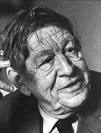
W. H. Auden (1907-1973), powerful poet writing during times of war. I mostly have been influenced since grade school, by his ability to articulate the angry feelings that war evokes. His poem below has been used by everyone in times of adversity.
Stop all the clocks, cut off the telephone
W. H. Auden
Stop all the clocks, cut off the telephone,
Prevent the dog from barking with a juicy bone,
Silence the pianos and with muffled drum
Bring out the coffin, let the mourners come.
Let aeroplanes circle moaning overhead
Scribbling on the sky the message He Is Dead,
Put crepe bows round the white necks of the public doves,
Let the traffic policemen wear black cotton gloves.
He was my North, my South, my East and West,
My working week and my Sunday rest,
My noon, my midnight, my talk, my song;
I thought that love would last for ever: I was wrong.
The stars are not wanted now: put out every one;
Pack up the moon and dismantle the sun;
Pour away the ocean and sweep up the wood.
For nothing now can ever come to any good.

Kofi Anyidoho
(1947-Present)
Renowned Ewe and African poet, Kofi Anyidoho of Ghana is one of those poets who has contributed much to many of us newer African writers in so many ways. He is able to bring the African oral tradition to life in every line, whether that line is in English or in Ewe. I was a fan of his poetry and his writing prior to meeting him. In fact, I used his writing to reference the scholarly section of my Ph.D. defense in preparation for my Creative Writing (Poetry) dissertation. I was very blessed to meet him first, finally, in Illinois at the ALA conference. But when I met him in Accra, Ghana, at the PALF writing residency I had summer of 2008, he was a great inspiration to me. He gave me a tour of the University of Ghana, introducing me to university officials, giving me a tour of the English Dept. at Legon, the other name of the university, and gave me a cd of his beautiful poetry. Then I heard him recite his poetry at one of the evening readings at the Pan African Literary Forum. He is a brother, a mentor, and an African poet, who has helped many of us newer poets see that one can certainly be an African writer even while writing away from home. Below is one of his beautiful poems. Enjoy.
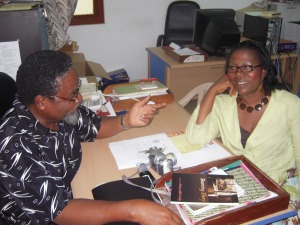 This is me with Poet and Professor, Kofi Anyidoho
This is me with Poet and Professor, Kofi Anyidoho
My Song
Kofi Anyidoho
Here
on
this
Public
Square
I
Stand
I sell My Song for those with ears to buy
It is to a tree that a bull is tied
You do not bypass the palm’s branches
to tap its wine
The things I have to say
I say them now
I shall stand aside
from those who care
to clear their throat and
dress their shame in lies
When you meet a poorly-dressed neighbour
at a great durbar
you do not spit on the ground
and roll your eyes to the skies
The umbrella I bought
You stole from my rooms at dawn
Now I walk in the early morning rain
You point at me to our young maidens
And they join you in laughter
Think
My People
Think
Think well before you laugh at those who walk in the rain.
The gifts that bestows at birth
Some had some splendid things
What was mine?
I sing. They laugh.
Still I sell My Song
for those with ears to buy
My cloth is torn, I know
But I shall learn to wear it well
My voice is hoarse, I know
But I shall learn to wear it well.

Langston Hughes
Hughes (February 1, 1902 – May 22, 1967), one of those poets whose mark remains with you forever. I discovered him early, probably as late back as in high school, and then in college, where I drank every bit of his poetry with hopes of following after his footsteps. I thought him in the 1990s and currently in African American lit classes and in any literature course about the world. As a poet writing in the 1960s, his voice joined the many voices of African poets seeking to bring Africa out of Colonialism. He was the Negritude poet for me just as poet, Aime Cesaire was in Martinique or Leopold Sedar Singhor was in Guinea. His poem below is one of my favorite.
The Negro Speaks of Rivers
———by Langston Hughes
I’ve known rivers:
I’ve known rivers ancient as the world and older than the
flow of human blood in human veins.
My soul has grown deep like the rivers.
I bathed in the Euphrates when dawns were young.
I built my hut near the Congo and it lulled me to sleep.
I looked upon the Nile and raised the pyramids above it.
I heard the singing of the Mississippi when Abe Lincoln
went down to New Orleans, and I’ve seen its muddy
bosom turn all golden in the sunset.
I’ve known rivers:
Ancient, dusky rivers.

Herb Scott
Herb Scott, (Feb. 8, 1931-Feb. 12, 2006) of Michigan, founded the New Issues Press that has published some of the finest poets in America today. He was my professor, mentor, friend and publisher, and without his influence, my career would not be where it is today. Herb was one of those who believed in you no matter where you come from, and worked with you no matter your race, class, educational level, etc. His life was lived as if he had not time to left, and when you walked into his life, he was there for you. Of all my influences, he remains a living monument in my life and poetry. He was as personal as a father could be. Love you Herb, and blessings to your beautiful family who shared you with the world. Enjoy the poem below. I recall reading it in tears at Herb’s memorial service in March of 2006.
Invocation
By Herb Scott
Skin, and bone, and weed
flower in the flesh.
Do not go to sleep.
Love is a dust we keep,
silt of the body’s dreaming.
Do not go to sleep.
If I were the speech of leaves
I’d let my body sing.
Do not go to sleep.
Words like willow branches
bend to the earth’s reach.
Do not go to sleep.
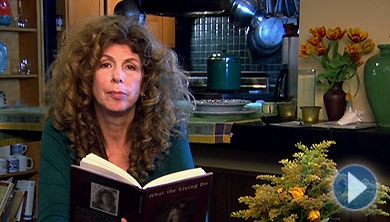
Marie Howe
(1950-Present)
One of my favorite poets, Marie Howe is a great American poet. I was influenced by her couplets, her ability to bring images to life, and her love of life. My favorite of her books, What the Living Do remains a lasting impression on me. I met her last spring at the AWP conference, and wasn’t it wonderful? She and I communicated by e-mail briefly after that, and despite my inability to meet with her this summer, I plan to reopen our dialogue and meet with her next summer for coffee. She is a great poet and I am her fan. Love you, Marie, and never told you that Marie is my middle name that got lost in the long list of names my parents gave me. My childhood friends still call me Marie, however.
The Star Market
by Marie Howe January 14, 2008
The people Jesus loved were shopping at the Star Market yesterday.
An old lead-colored man standing next to me at the checkout
breathed so heavily I had to step back a few steps.
Even after his bags were packed he still stood, breathing hard and
hawking into his hand. The feeble, the lame, I could hardly look at them:
shuffling through the aisles, they smelled of decay, as if the Star Market
had declared a day off for the able-bodied, and I had wandered in
with the rest of them—sour milk, bad meat—
looking for cereal and spring water.
Jesus must have been a saint, I said to myself, looking for my lost car
in the parking lot later, stumbling among the people who would have
been lowered into rooms by ropes, who would have crept
out of caves or crawled from the corners of public baths on their hands
and knees begging for mercy.
If I touch only the hem of his garment, one woman thought,
could I bear the look on his face when he wheels around?
looking for cereal and spring water.
Jesus must have been a saint, I said to myself, looking for my lost car
in the parking lot later, stumbling among the people who would have
been lowered into rooms by ropes, who would have crept
out of caves or crawled from the corners of public baths on their hands
and knees begging for mercy.
If I touch only the hem of his garment, one woman thought,
could I bear the look on his face when he wheels around?
FINALLY
There are numerous more influences that I cannot include in these brief pages. Some of these great authors are short story writers or have no poetry online to post. Writers like Ama Ata Aidoo of Ghana, whose story telling style reminds me of how my Iyeeh and my mother told the ancient Grebo tales to me, Buchi Emecheta’s feminist drive for bringing out the stories of women, Kojo Laing and his humor, and Kwesi Brew and his oral traditional wit have all left their mark on me. Others like Bai T. Moore of Liberia, whose poem, “Monrovia Market Women,” remains embedded in my mind, S. Henry Cordor, who was one of my first writing mentors, Robert H. Brown of Liberia, and Althea Romeo Mark, fellow writers, former professors, friends and mentors have all left their mark on my own career, and there would be no space on the Internet were I to recall all of these great writers. If you are like me, maybe all you can do is to continue to write and publish, continue to pass on your skills to other students of writing, continue to cry out against injustices through your own poetry, just continue to be you. It is a privilege to be able to say that someone touched my life and maybe I, too, can touch another person’s life. Maybe you too can touch someone’s life. Life is too short to live forgetting those who have given more than their share to you directly or indirectly.



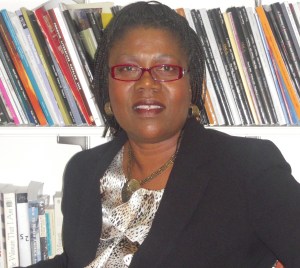
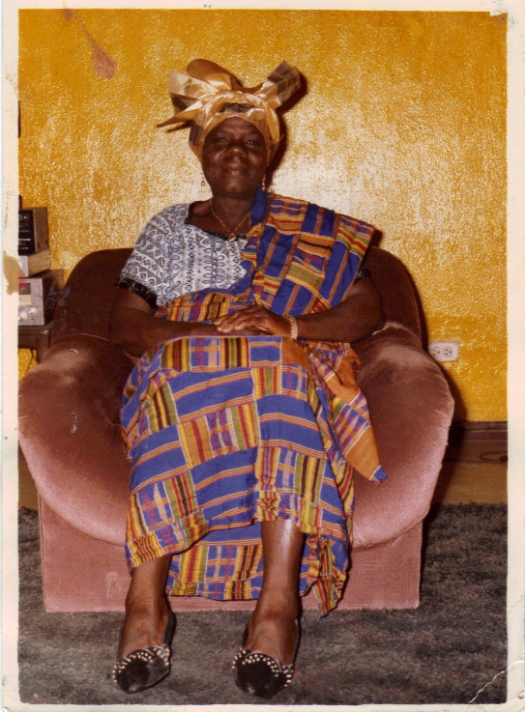










 This is me with Poet and Professor, Kofi Anyidoho
This is me with Poet and Professor, Kofi Anyidoho




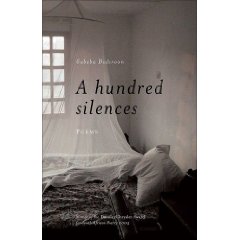


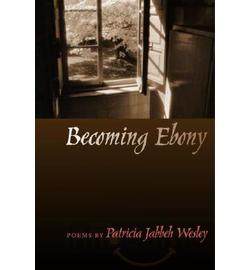




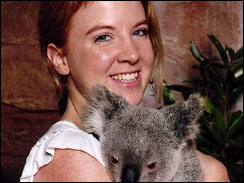
 Grieving family members
Grieving family members
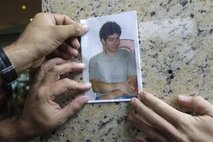 Photo of young, Lucas Juca of Brazil who also went down with the plane.
Photo of young, Lucas Juca of Brazil who also went down with the plane.

 I took this photo during my visit to New York University where I was invited to read my poetry with two other writers on October 24, 2008. Here, Quincy was introducing me. But here is a clearer photo of him.
I took this photo during my visit to New York University where I was invited to read my poetry with two other writers on October 24, 2008. Here, Quincy was introducing me. But here is a clearer photo of him.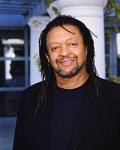

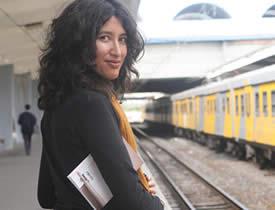

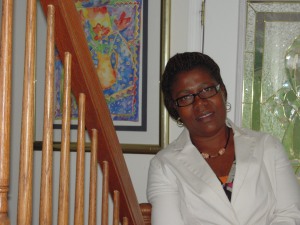
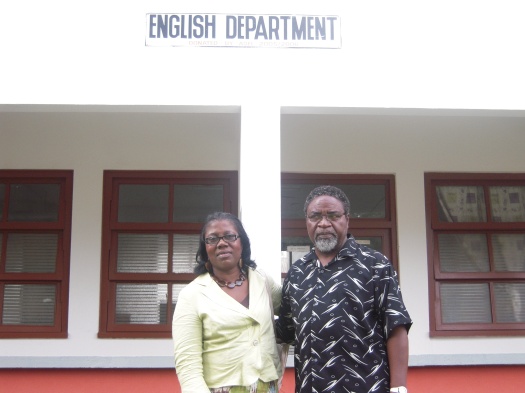

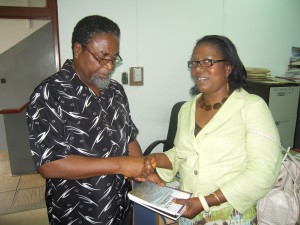
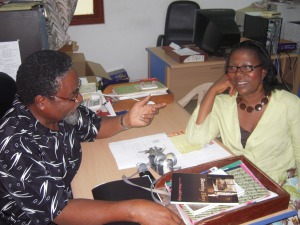


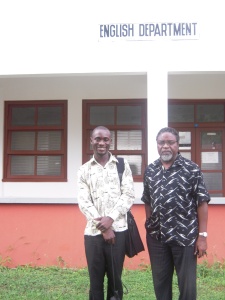
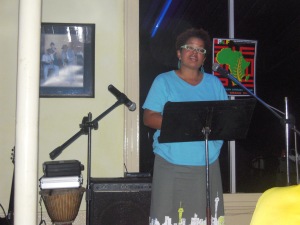



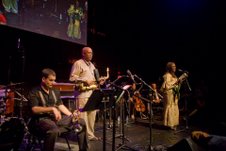





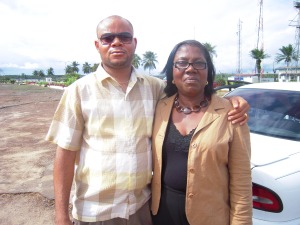

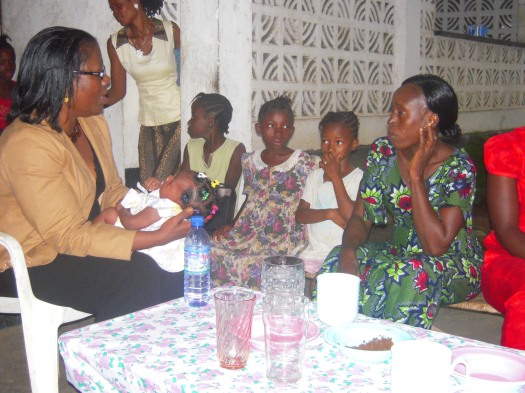 Here I am with my family, holding my sister, Kwadi Jabbeh’s baby. My sister, Margretta and others were cut out of the photo.
Here I am with my family, holding my sister, Kwadi Jabbeh’s baby. My sister, Margretta and others were cut out of the photo.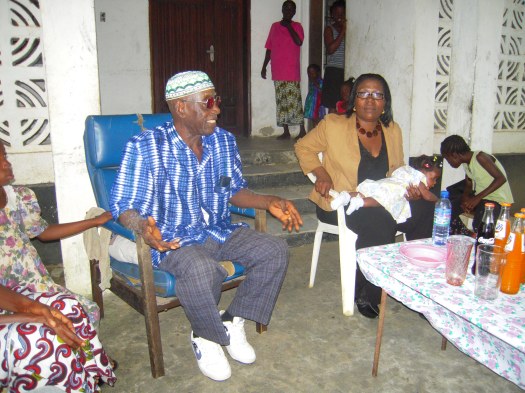 Here is my 83 year-old father, laughing, happy to see me after eight years, and happy to have us gathered as a family after nearly twenty years during which most of the family were dispersed by the fifteen year old civil war. After the kola nut and spiced pepper Grebo greeting, then comes the drinks and speeches. Family members are cut out of this photo.
Here is my 83 year-old father, laughing, happy to see me after eight years, and happy to have us gathered as a family after nearly twenty years during which most of the family were dispersed by the fifteen year old civil war. After the kola nut and spiced pepper Grebo greeting, then comes the drinks and speeches. Family members are cut out of this photo.
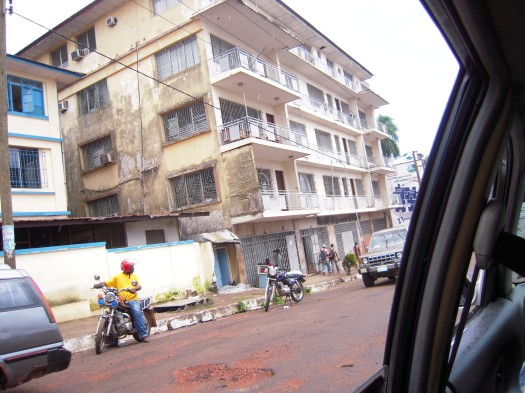
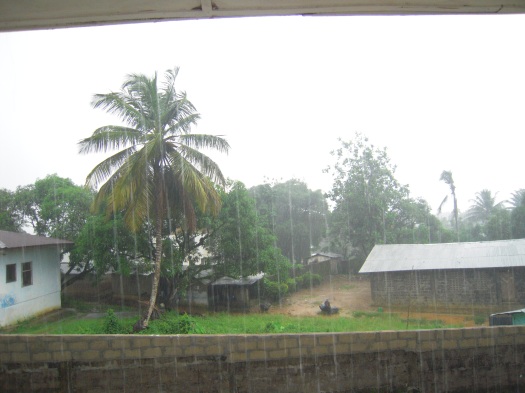
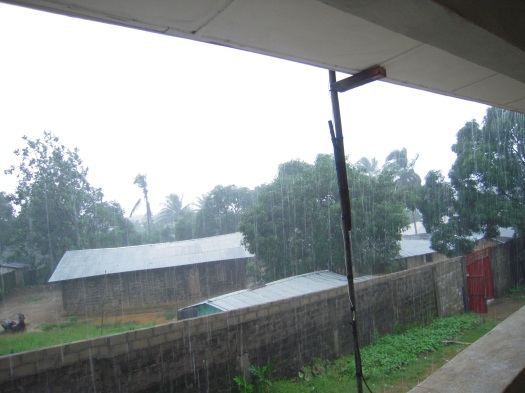

You must be logged in to post a comment.